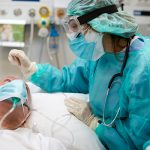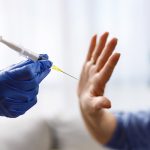A prestigious Commonwealth Health Minister’s Award; new funding for important projects tackling superbugs, heart failure and hepatitis C; a two-minute video that could help overcome poor genital self-image in teens; why vaccine refusers consider themselves science advocates; and continuing work on COVID-19, with our researchers looking into outcomes of patients admitted to ICU, the importance of backwards contact tracing, and how acceptance and humour are the best antidote to the lockdown blues. Here’s just some of what’s been happening this week at the Alfred Research Alliance.
MONASH PUBLIC HEALTH & PREVENTIVE MEDICINE
Eric Chow Wins Prestigious Commonwealth Health Minister’s Award

Monash sexual health researcher A/Prof Eric Chow has won the 2020 Commonwealth Health Minister’s Award for Excellence in Health and Medical Research for his work on understanding transmission and control of STIs. A/Prof Chow’s research aims to improve treatment, prevention and control of sexually transmitted infections (STI), with a particular interest in gonorrhoea, syphilis and human papillomavirus (HPV). He is currently conducting clinical trials to examine whether antiseptic mouthwash could be used as a novel treatment and preventive strategy for gonorrhoea. Read more…
Outcomes of COVID-19 Patients Admitted to ICU

The collaborative Short PeRiod INcidence sTudy of Severe Acute Respiratory Infection (SPRINT-SARI) study led by Monash University has captured national data on the number of COVID-19 patients admitted to Intensive Care Units (ICUs) from the country’s first wave of the pandemic, from the end of February to the end of June 2020, revealing that Australia’s low ICU bed occupancy rate of 14 per cent contributed to earlier admission to ICUs for the sickest patients, and these factors were associated with a lower mortality rate than other countries. Read more…
Vaccine refusers consider themselves a science advocacy group

Australian vaccine refusers are health literate and believe they are pro-science. But, according to a new study published this week, that simply reinforces their views. The study, led by post-doctoral fellow Tomaz Rozbroj, found people who refuse vaccines build their views on mainstream trends, including the trend towards consumer-driven health care, exposure to alternative helath paradigms, distrust in ‘big pharma’ and in government, highlighting the need for higher public health literacy, particularly amid the COVID-19 ‘infodemic’. Read more…
MONASH CENTRAL CLINICAL SCHOOL
$3.4M MRFF funding for fight against superbugs
 Prof Anton Peleg and team from Monash CCS and The Alfred have been awarded a $3.4M grant from the Medical Research Future Fund (MRFF) Genomics Health Futures Mission for the ‘Genomics, Digital Health and Machine Learning: the SuperbugAi Flagship’ project. This innovative project will integrate the most transformative technologies in healthcare; genomics, electronic healthcare data and artificial intelligence, in order to diagnose, treat and prevent antimicrobial resistance in hospitals and the healthcare system. Read more…
Prof Anton Peleg and team from Monash CCS and The Alfred have been awarded a $3.4M grant from the Medical Research Future Fund (MRFF) Genomics Health Futures Mission for the ‘Genomics, Digital Health and Machine Learning: the SuperbugAi Flagship’ project. This innovative project will integrate the most transformative technologies in healthcare; genomics, electronic healthcare data and artificial intelligence, in order to diagnose, treat and prevent antimicrobial resistance in hospitals and the healthcare system. Read more…
Study aims to redress poor genital self-image in teens
 Cosmetic genital surgery is on the rise and the most common procedure is a labiaplasty, the surgical reduction of the inner vaginal lips so they don’t overlap the outer lips. This procedure is on the rise in teenage girls, driven by a skewed perception of normality, based on images seen online. A recent study led by Dr Gemma Sharp and published in the journal Body Image looked at how a two-minute video highlighting normal variability in labia shape and size could assist in creating a positive genital self-image. Read more…
Cosmetic genital surgery is on the rise and the most common procedure is a labiaplasty, the surgical reduction of the inner vaginal lips so they don’t overlap the outer lips. This procedure is on the rise in teenage girls, driven by a skewed perception of normality, based on images seen online. A recent study led by Dr Gemma Sharp and published in the journal Body Image looked at how a two-minute video highlighting normal variability in labia shape and size could assist in creating a positive genital self-image. Read more…
Humour and acceptance most helpful during lockdown
 A Monash survey of over 1500 Australians conducted during the first national lockdown has found that humour and acceptance are far more likely to assist in promoting mental health than venting or trying to distract yourself about what is happening in the world. The survey, led by A/Prof Caroline Gurvich, was the first to look at coping mechanisms to the anxiety and depression triggered by the pandemic. It found positive reframing, acceptance and humour were the best antidotes to COVID-related depression and anxiety. Read more…
A Monash survey of over 1500 Australians conducted during the first national lockdown has found that humour and acceptance are far more likely to assist in promoting mental health than venting or trying to distract yourself about what is happening in the world. The survey, led by A/Prof Caroline Gurvich, was the first to look at coping mechanisms to the anxiety and depression triggered by the pandemic. It found positive reframing, acceptance and humour were the best antidotes to COVID-related depression and anxiety. Read more…
BAKER HEART AND DIABETES INSTITUTE
New MRFF Funding for Heart Failure Project
 A $674,659 NHMRC Development Grant was announced this week for the ‘Anti-inflammatory compound development for the treatment of heart failure with preserved ejection fraction (HFpEF)’ project. Led by Prof David Kaye working with A/Prof Bing Wang and Dr Guy Krippner, the project seeks to provide an urgently needed effective treatment for HFpEF, and this new funding will enable the team to take it to the next stage of identifying the lead clinical candidate and preparing the portfolio necessary for Investigational New Drug filing and phase I clinical testing.
A $674,659 NHMRC Development Grant was announced this week for the ‘Anti-inflammatory compound development for the treatment of heart failure with preserved ejection fraction (HFpEF)’ project. Led by Prof David Kaye working with A/Prof Bing Wang and Dr Guy Krippner, the project seeks to provide an urgently needed effective treatment for HFpEF, and this new funding will enable the team to take it to the next stage of identifying the lead clinical candidate and preparing the portfolio necessary for Investigational New Drug filing and phase I clinical testing.
BURNET INSTITUTE
NHMRC support for Burnet hepatitis research
 Burnet research into hepatitis C will benefit from National Health and Medical Research Council (NHMRC) grants of over $1.9 million, including a $781,353 grant for the development of a molecular point-of-care test for hepatitis C to increase uptake of curative antiviral treatments. Chief investigator A/Prof Jack Richards says this could be a ‘game changer’ for hepatitis C treatment, as it’s much cheaper than existing point-of care texts and can be made available where they could be most useful. Read more…
Burnet research into hepatitis C will benefit from National Health and Medical Research Council (NHMRC) grants of over $1.9 million, including a $781,353 grant for the development of a molecular point-of-care test for hepatitis C to increase uptake of curative antiviral treatments. Chief investigator A/Prof Jack Richards says this could be a ‘game changer’ for hepatitis C treatment, as it’s much cheaper than existing point-of care texts and can be made available where they could be most useful. Read more…
COVID-19 super spreading events highlight need for backwards contact tracing
 Burnet research has highlighted the role of superspreading events in the COVID pandemic, emphasising the importance of both forward and backward contact tracing to halt the virus’ spread. Unlike the regular flu, coronaviruses spread in clusters, rather than in a linear fashion, with 10% of infected COVID-19 cases infecting more than 80% of people. Prof Mike Toole AM told ABC Radio Melbourne this week that the wide dispersion of a cluster can rapidly see the virus spread out of control. Read more…
Burnet research has highlighted the role of superspreading events in the COVID pandemic, emphasising the importance of both forward and backward contact tracing to halt the virus’ spread. Unlike the regular flu, coronaviruses spread in clusters, rather than in a linear fashion, with 10% of infected COVID-19 cases infecting more than 80% of people. Prof Mike Toole AM told ABC Radio Melbourne this week that the wide dispersion of a cluster can rapidly see the virus spread out of control. Read more…
